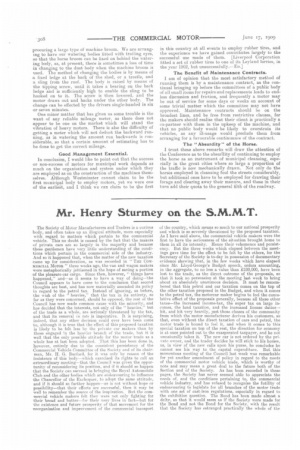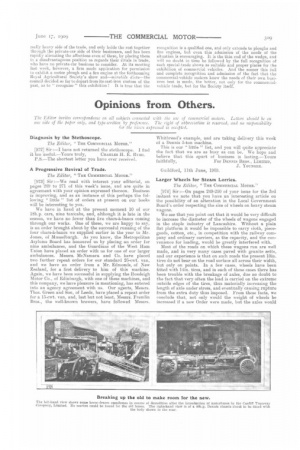Mr. Henry Sturmey on the S./Vi.M.T.
Page 20

Page 21

If you've noticed an error in this article please click here to report it so we can fix it.
The Society of Motor Manufacturers and Traders is a curious body, and often takes up an illogical attitude, more especially with regard to matters which pertain to the commercial vehicle. This no doubt is caused by the fact that the makers of privets, cars are so largely in the majority and because these gentlemen have very little understanding of the conditions which pertain in the commercial side of the industry. And so it happened that, when the matter of the new taxation came up for consideration, as was recorded in "THE COMMERCIAL MOTOR" three weeks ago, the van and wagon makers were metaphorically jettisoned in the hope of saving a portion of the pleasure-car cargo. Since then, however, "things have happened," and—as it seems to have a way of doing—the Council appears to have come to the conclusion that second thoughts are best, and has now materially amended its policy in regard to the petrol tax. Instead of ignoring, as before, the wish of the " heavies," that the tax in its entirety, so far as they were concerned, should be opposed, the rest of the Council has now made common cause with the minority, and has decided that the interests, not only of the " heavies," but of the trade as a whole, are seriously threatened by the tax, and that its removal in tole) is imperative. It is surprising, indeed, that any other decision could ever have been come to, although it is true that the effect of this proposed taxation is likely to be felt less by the private car makers than by those engaged in the heavier branch of the trade, but it is well that the only possible attitude for the motor trade as a whole has at last been adopted. That this has been done is, however, entirely due to the consistent persistency of the Commercial Vehicle Committee of the Society and of its chairman, Mr. H. G. Burford, for it was only by reason of the insistence of this body—which exercised its rights to call an extraordinary meeting—that the Council was given the opportunity of reconsidering its position, and if it should so happen that the Society can succeed in bringing the Royal Automobile Club and the other bodies which are endeavouring to influence the Chancellor of the Exchequer, to adopt the same attitude, and if it should so further happen—as is not without hope or possibility—that their efforts are successful, then it may he well to remember the source of the inspiration. But the commercial vehicle makers felt they were net only fighting for their bread and butter—for their very lives in fact—but for the existence and future prosperity of that movement for the 'reorganisation and improvement of the commercial transport of the country, which means so much to our national prosperity and which is so severely threatened by the proposed taxation. As I have said above, the commercial vehicle makers were the first to have the seriousness of the situation brought home to them in all its intensity. Hence their vehemence and persiatency. But the three weeks which elapsed between the meetings gave time for the effect to be felt by the others, for the Secretary of the Society is to-day in possession of documentary evidence showing that, in the few weeks which have elapsed since Mr. Lloyd-George's Budget speech, orders amounting, in the aggregate, to no less a value than £100,000, have been lost to the trade, as the direct outcome of the proposals, so that it took no persuasion at the meeting last week to bring about an absolutely unanimous decision. It must be remembered that this petrol and car taxation comes on the top of the other taxation proposed in the Budget, and when it comes to the petrol tax, the motorcar maker begins to feel the cumulative effect of the proposals generally, because all these other taxes—the increased income-tax, the super tax on large incomes, the land taxation, and the increased license duties— hit, and hit very heavily, just those classes of the community from which the motor manufacturer derives his customers, so that, even without the direct taxation of cars and petrol, the motor trade is bound to feel it, and when it comes to this special taxation on top of the rest, the direction for economy is at once pointed out to the exasperated taxpayer, and he not unnaturally takes it. The new car is not ordered by the private owner, and the trader decides he will stick to his horses, as, in view of the new calls upon his purse, he concludes he cannot see his way to the capital expenditure. But this momentous meeting of the Council last week was remarkable for yet another amendment of policy in regard to the needs of the commercial motor vehicle trade, which is worthy of note and may mean a great deal to the future both of the Seetion and of the Society. As has been recorded in these pages, the Society has never seemed able to appreciate the needs of, and the conditions pertaining to, the commercial vehicle industry, and has refused to recognise the futility of endeavouring to legislate for all branches of the motor trade with one set of cast-iron regulations, especially in regard to the exhibition question. The Bond has been made almost a deity, RO that it would seem as if the Society were made for the Bond and not the Bond for the Society, with the result that the Society has estranged practically the whole of the really heavy side of the trade, and only holds the rest together through the private-car side of their businesses, and has been rapidly alienating the affections even of these, by placing them in a disadvantageous position as regards their rivals in trade, who have no private-car business to consider. At its meeting last week, however, a firm made application for permission to exhibit a motor plough and a fire engine at the forthcoming Royal Agricultural Society's show and—mirabite diet-ft—the council decided so far to depart from its cast-iron custom of the past, as to " recognise " this exhibition I It is true that the recognition is a qualified one, and only extends to ploughs and fire engines, but even this admission of the needs of the situation is encouraging. It is the thin end of the wedge, and Nvill no doubt in time be followed by the full recognition of such special-trade shows as suitable and proper places for the exhibition of commercial vehicles. And the sooner this full and complete recognition and admission of the fact that the commercial-vehicle makers know the needs of their own business best is made, the better, not only for the commercialvehicle trade, but for the Society itself.
























